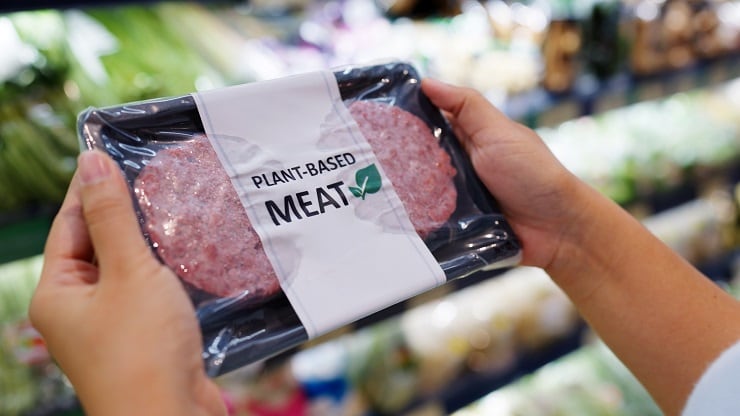Givaudan Taste & Wellbeing, the food arm of flavour and fragrance company Givaudan, and the University of California (UC) Berkeley explore how alternative protein (alt-protein) developers can maximise efficiency in their production of new and existing formulations as well as in their operations.
In its research, the Californian University and company explore the alt-protein industry’s key challenges, such as supply chain issues, resource consumption, production scale-up, and competitive pricing. It also offers ten actionable steps to help alt-protein producers address these threats to business and maximise efficiency.
Slowed down plant performance in 2023
Plant-based meat varieties have struggled to take off in 2023. Marking a year marred with policy confusion and criticism, as this systematic literature review found, has led to a slowdown in alt-protein promotion rather than its expedition.
In a move that appears to buck the trend, Givaudan and UC Berkeley have come together again to release new research on redefining efficiency in alt-proteins. The new whitepaper considers ten pathways to create more affordable, sustainable plant-based products, signalling their continued focus and hope in a rebooted alt-protein category.
“It’s important to note the alternative protein sector is not immune to the pressures facing the food industry as a whole,” Sylvain Jouet, Global Product Manager at Givaudan Taste & Wellbeing, told FoodNavigator. “Growth has slowed, and factors such as high raw material costs, geopolitical issues, inflation, and cost-of-living increases have affected food brands and consumers alike,” Jouet continued.
Despite the plant sector’s slowed uptake in 2023, Givaudan considers the plant-based sector a buoyant market that will bounce back. “There is an opportunity to create greater efficiency and turn some of the challenges into opportunities for growth,” Jouet noted.
Rebooting the plant-based sector
In their fifth annual collaboration, Givaudan and Berkeley’s joint research identifies key challenges and opportunities in the food industry’s path to creating alt-proteins with appealing nutritious and organoleptic properties, namely taste. The duo’s latest research builds upon its existing collaborative efforts centred on technologies, nutrition, fish and seafood, and plant protein in the alt-protein sector.
The global retail meat and dairy substitute market was valued at €28 billion ($31 bn) in 2022 and is expected to grow at a compound annual growth rate (CAGR) of 20% to reach €96 billion ($105 bn) by 2030, Givaudan told FoodNavigator, citing Bloomberg, Euromonitor, BCG and Givaudan estimates.
“The market is primarily driven by an increase in consumer interest in healthier and more ethical protein choices,” said Jouet. In its new white paper, Givaudan and UC Berkeley’s research focuses on enhancing efficiency in alternative protein, offering key opportunities and actionable pathways, from selecting the right ingredients and exploring hybrid products to optimising processes and forming strategic partnerships.
“Alternative proteins can significantly reduce environmental impact and improve human health,” said Sudhir Joshi, Professor, Board Member and Product Development Programme Coach at UC Berkeley.
The duo’s findings identified four key areas where producers can focus on improving efficiencies and reducing costs for alternative protein products. “These were further divided into specific steps companies can take to mitigate risk while still making tasty, healthy, and cost-effective products,” Joshi added.
Embracing ingredient diversity
Amid the plant-based sector’s slowed growth in 2023, the industry’s eyes are on which direction it will go in 2024. According to Givaudan, ingredients are a crucial area to watch. “Our research illustrates that ingredients can account for a substantial amount of the cost of a product,” said Jouet.
Identifying ingredient combinations to ensure the best quality and value for food developers and consumers and outlining ways to optimise energy, water, and other natural resources are among the crucial areas to look out for.
In its research, Givaudan and UC Berkeley have referred to three different actions companies can take to optimise ingredients while ensuring that consumers get affordable, tasty, and nutritious products. These steps include choosing local ingredients, incorporating wholesome bulking agents and circular solutions, and utilising government subsidies.
Industry-wide collaboration
“We know there are many opportunities in the alt-protein sector for maximising efficiency,” said Jouet. But to truly embrace them, Givaudan notes organisations will also need to address some hurdles. “Partnering, co-creating, and collaborating will ensure access to specialised expertise and innovative networks to help companies forge ahead in this rapidly developing market,” added Jouet.
Through its network of protein hubs, Givaudan seeks to encourage cross-industry actions. It provides the alt-protein sector access to a global ecosystem of digital technologies, plant-based experts, and an integrated portfolio of solutions designed specifically for alternative meat and dairy products.
“In today’s dynamic environment, the key to gaining a competitive edge lies in strategic partnerships,” Flavio Garofalo, Global Director of Culinary & Plant Attitude at Givaudan, said. “Companies that team up with others to pool their knowledge, expertise and resources will be better placed to spot market opportunities, unlock efficiencies, and scale innovations more quickly,” added Garofalo.
Experiential eating
For consumers to fully embrace plant-based products, Givaudan believes the sector needs to consider the whole experience, incorporating all the senses in its products.
“We are also committed to continuously improving the taste and nutritional profiles of alt-proteins,” said Jouet. “Together, we can create multisensory plant-based food experiences that are not only mouth watering but also more sustainable–driving more mindful diets while supporting health and wellbeing,” added Jouet.
Referencing its ongoing partnership with UC Berkeley to better understand alt-proteins, Garafalo details its collaboration helps Givaudan “look at alternative protein in a more holistic way, which puts us in a better position to support our customers”.
Following the launch of its new research, Givaudan is launching a startup challenge. The company will select five startups from around the globe to lower standard recipe costs using the recommendations outlined in the white paper, including raw material optimisation, hybrid products, process optimisation, and new technology.
Challenges set to continue
In 2024, the obstacles facing the plant-based sector will not go away. “These challenges are set to continue into 2024,” confirmed Jouet. “However, the industry can turn these obstacles into opportunities by focusing on efficiency,” added Jouet. Plant-based brands can address supply chain resilience, resource consumption, scaling up production by partnering with big industry players, and competitive pricing.
Supply chain issues require flexible strategies for sourcing and transporting both raw materials and finished goods to retailers and restaurants. “In addition, companies must continue to reduce water, energy, and land use,” added Jouet.
To scale up from small to large-scale production, Jouet suggests that “companies may want to collaborate with bigger partners to test the market before investing”. Over the longer term, these brands may wish to invest in new facilities and equipment. “To reach a wider consumer base, pricing must be competitive, a factor highlighted by the pandemic-induced demand for plant-based options,” added Jouet.
However, for now, the outlook is focused on positive growth. “With more consumers expected to explore plant-based protein, opportunities abound for food producers and retailers to develop sustainable, healthy alternatives that deliver diverse food experiences,” said Jouet.



